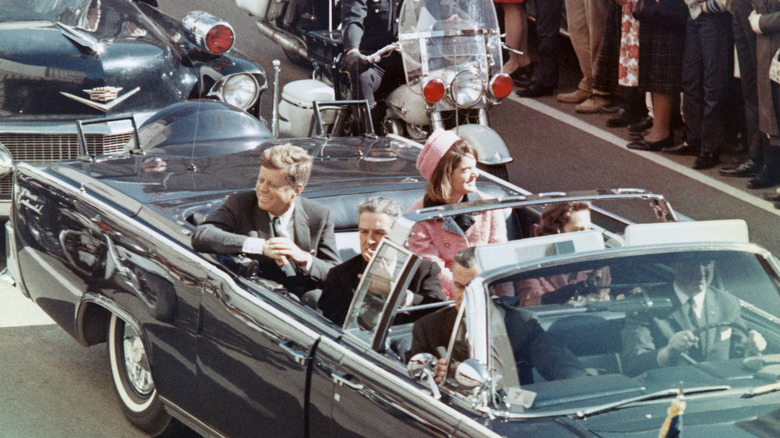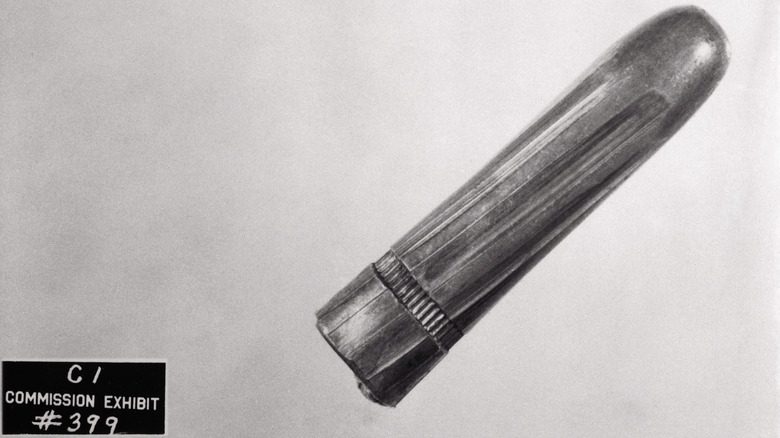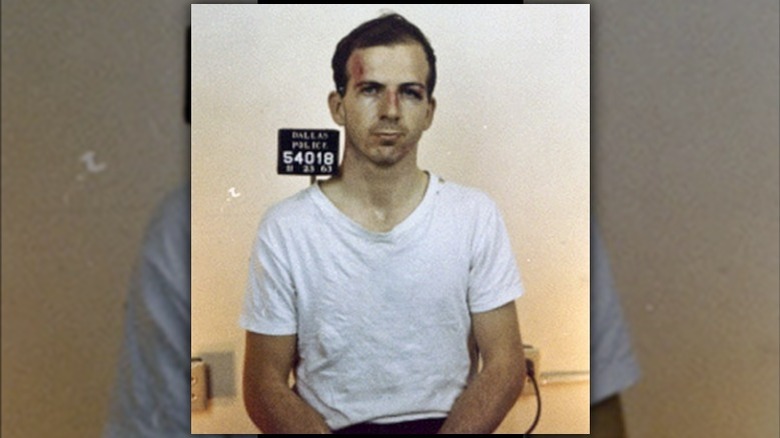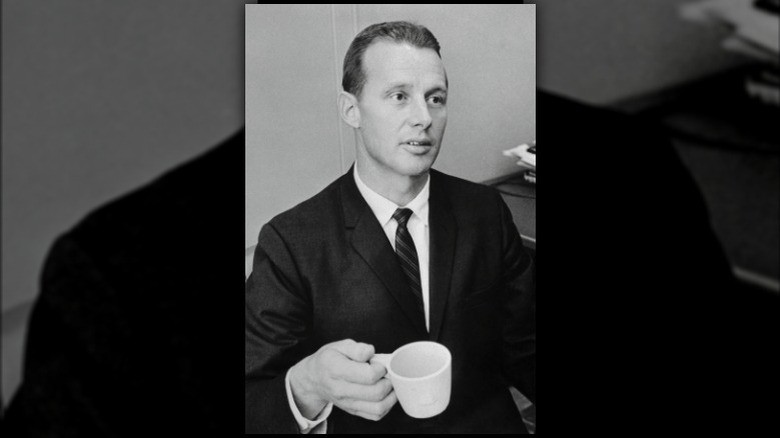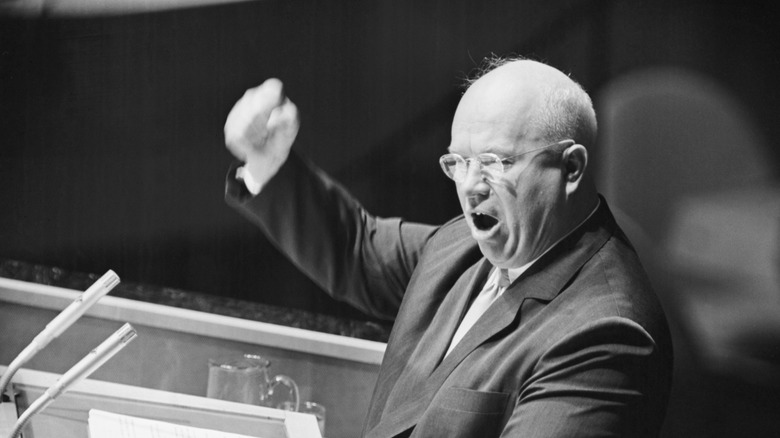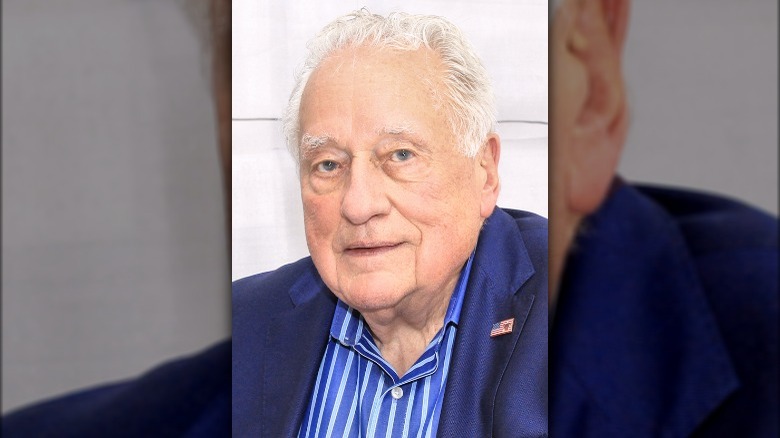Details We Only Learned Years After JFK's Assassination
We may receive a commission on purchases made from links.
The assassination of John F. Kennedy is one of the most monumental, generation-defining events in United States history. "For those people who lived through it and came of age in the 1960s, it represented a significant shift in American culture," author and historian Stephen Fagin told the Associated Press. Notably, the public's trust in the country's institutions and leaders began to decline, and it's never truly recovered since. In the aftermath of JFK's death, conflicting witness reports and conspiracy theories swirled, and to this day, various accounts continue to be debated and contested.
There are quite a few details that we only learned long after the JFK assassination — details that have acted to further fuel the many theories about the fateful day. New revelations have caused various figures to piece together different perspectives of the murder, and it seems like Americans may never agree on what exactly happened on November 22, 1963. Here are some of the most consequential things that were brought to light in the years after Lee Harvey Oswald killed the 35th president of the United States.
A mysterious bullet
Sixty years after John F. Kennedy was assassinated, a Secret Service agent who was feet away from the president when he was shot cast another shadow of doubt over the accepted story. In his 2023 book "The Final Witness," Paul Landis said he was the one who placed the bullet found a stretcher that allegedly held Governor John B. Connally. The notion that the round came from Connally supports the single "magic bullet" theory that claims a single shot hit both JFK and Connally. Landis said he found the projectile on top of the rear seat, behind where JFK was sitting, on a ledge where the cushion met the metal of the car. "Instead of reaching down and replacing the bullet where I had found it, like I had done with the bullet fragment, I slipped it into my right suit coat pocket," he wrote in "The Final Witness. He planned to later give the bullet to Roy Kellerman, assistant special agent in charge (ASAIC) of the Kennedy detail, and explain his actions — but that didn't happen.
At a chaotic Parkland Hospital, Landis recounted being whisked into the facility along with hospital staff and Secret Service agents, and eventually ended up in the room with Kennedy on his gurney. Eventually, the doctor at the examination table yelled for everyone to leave so the medical team could have room to work. "People were starting to leave the room," he wrote. "I had to make another split-second decision." And that's when he allegedly placed the bullet. His story has been questioned, but if true, it would throw a wrench into the magic-bullet theory, and no doubt fuel conspiracies that Lee Harvey Oswald didn't act alone.
The FBI wanted Lee Harvey Oswald pegged as the killer
Lee Harvey Oswald, who was killed by nightclub owner Jack Ruby just two days after he shot John F. Kennedy dead, took the president's life with his Colt revolver. The Warren Commission determined he acted alone, but plenty of conspiracy theories suggest he had help. In October 2017, declassified FBI files revealed that the bureau thought it important that the public believe Oswald acted alone, NBC News reported. "There is nothing further on the Oswald case except that he is dead," FBI Director J. Edgar Hoover wrote in a memo issued on November 24, 1963, the day Oswald died.
This aligns with documents declassified in 1994 that revealed Assistant Attorney General Nicholas Katzenbach urged the same in a memo to the White House one day after Oswald was killed. "The public must be satisfied that Oswald was the assassin; that he had no confederates who are still at large; and that evidence was such that he would have been convicted at trial," he wrote, per New York Magazine. The outlet also noted that evidence suggests the Warren Commission was likely influenced by top-level government forces to conclude Oswald acted alone — before it even began its investigation. President Lyndon B. Johnson, who took office after JFK died, called Georgia Senator Richard Russell Jr. on November 29 to inform him he would serve on the Warren Commission and stress the importance of making clear Oswald — who had stated he was a Communist and defected to the Soviet Union in 1959 — had no ties to the Soviets or their Cuban allies.
Alleged threats from the Secret Service
In the 2023 documentary "JFK: What the Doctors Saw," Dr. Robert McClelland — who worked to save John F. Kennedy — made a chilling claim that is no doubt fodder for those who believe there was a cover-up around the assassination of the president. McClelland noted that Dr. Malcolm Perry (above) initially said in a press conference that JFK's throat wound appeared to be an entrance wound, which could suggest a second gunman — one firing from the front, and Lee Harvey Oswald from the back. "When [Dr. Perry] left the room, someone came up to him who Dr. Perry thought maybe was a Secret Service man, and he told Dr. Perry, 'You must never, ever say that was an entrance wound again if you know what's good for you,'" McClelland recalled.
McClelland died in 2019 at age 89, and he was steadfast in his conclusion that there was likely more than one shooter involved in the assassination, which he deemed a probable "conspiracy." He believed the shot that killed Kennedy came from the now-infamous grassy knoll — at the right-front of his motorcade on the north side of Elm Street — where some witnesses have claimed to have seen a shooter fire at the president from the front.
An alleged Soviet plot
In "Operation Dragon: Inside The Kremlin's Secret War on America," ex-CIA chief R. James Woolsey and Lieutenant General Ion Mihai Pacepa — a former acting chief of Communist Romania's secret police, Securitate — claim that Oswald was a KGB associate who was ordered by Soviet leader Nikita Khrushchev to assassinate John F. Kennedy. The KGB was the Soviet Union's secret security and intelligence organization, at one point the largest of its kind in the world. They said Khrushchev later called the plan off, but Oswald went forward with it. The pair point to the 26-volume Warren Commission Report, which they say offers the evidence in the form of "KGB patterns and codes."
"Decoded, these pieces of evidence prove that John F. Kennedy's assassin, Lee Harvey Oswald, had a clandestine meeting in Mexico City with his Soviet case officer, 'comrade Kostin,' who has been identified by the CIA as belonging to the KGB's Thirteenth Department for assassinations abroad," the authors write. They claim that Oswald was recruited in 1957 while serving as a U.S. Marine in Japan's Atsugi naval air facility — two years before he defected to the Soviet Union — and then assigned to the plot to kill Kennedy in 1962.
A Secret Service agent attempted suicide
Anyone who saw John F. Kennedy's assassination or has seen the video footage probably remembers the Secret Service agent who ran up to the limousine and climbed onto the back of the vehicle to try and save him. Clint Hill is the man's name, and almost 60 years after the incident, he opened up about how it still affected him. He lives with post-traumatic stress disorder (PTSD), and in his 2022 book "My Travels with Mrs. Kennedy," he revealed that he tried to died by suicide.
It was the night of December 29, 1963, just over a month after JFK was killed. Hill was assigned to head Jacqueline Kennedy's detail in Palm Beach, Florida, where she and her children were to visit extended family. Guilt was on his mind, and the events of November 22 were running through his head. He was drinking at a bar before he left and headed toward the ocean, entering the water fully-clothed, where he considered drowning himself.
Speaking to NPR's Radio Diaries in November 2023, he described the guilt he had over the assassination, which he blamed himself for. After the incident, he went into an "extreme depressed state" at his Virginia home. "I lived on two packs of cigarettes a day and a bottle of scotch," he said. "That's how I slept." Now, he offers advice for people who experience PTSD, stressing the importance of talking to others. "The more they talk about it, the better they're going to feel," he told NPR.
[Featured image by Larry D. Moore via Wikimedia Commons | Cropped and scaled | CC BY 4.0]
If you or someone you know needs help with mental health, please contact the Crisis Text Line by texting HOME to 741741, call the National Alliance on Mental Illness helpline at 1-800-950-NAMI (6264), or visit the National Institute of Mental Health website.
If you or someone you know is struggling or in crisis, help is available. Call or text 988 or chat 988lifeline.org.
